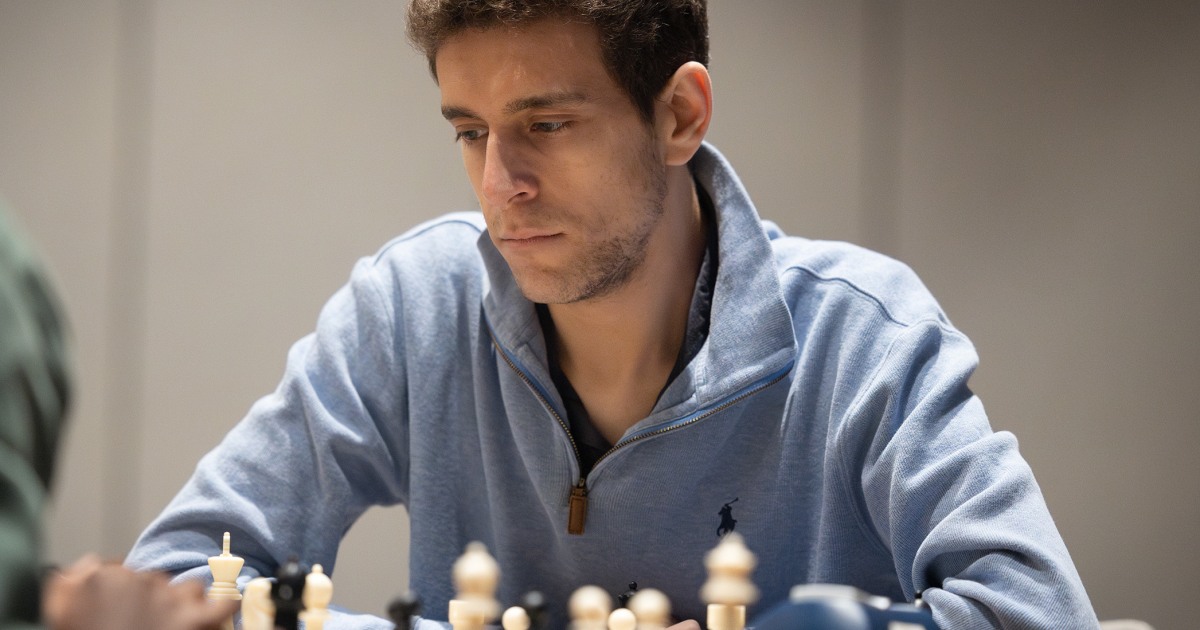The death of American grandmaster Daniel Naroditsky has sent shock waves through the professional chess world, with many top players blasting a Russian rival who accused him of cheating during online matches.
They said Naroditsky, whose death at age 29 was reported Monday, was bullied relentlessly online by Russian former world champion Vladimir Kramnik, with some calling for Kramnik to be banned from the game.
Kramnik, who has accused many players of cheating in online play, first voiced “concerns” about Naroditsky’s play last year, leading to an ongoing feud between the two players. Kramnik routinely posted online about Naroditsky, calling for an investigation into his play and at times appearing to threaten legal action against him.
In an October 2024 interview, Naroditsky characterized Kramnik’s efforts as “a sustained, evil and absolutely unhinged attempt to destroy my life.”
Others in the chess community said the accusations had taken their toll.
“He said he was under immense stress due to a lot of baseless accusations — headed by Kramnik, of course,” Indian grandmaster Nihal Sarin, who said he was the last to play Naroditsky, told The Indian Express.
“I can totally imagine the pain he was going through and it has been going on for a very long time,” he told the paper. Sarin did not immediately respond to an NBC News request for comment.
Nemo Zhou, a Chinese-born grandmaster who has also emerged in recent years as a popular chess content creator, said in an email that Kramnik subjected Naroditsky to “self-indulging harassment.”
“Kramnik operates in his own fake reality where he is the voice of righteousness and leverages that with his followers for profit,” Zhou wrote. “He doesn’t care about the truth or who he hurts along the way.”
On X, Zhou called for the chess world governing body to remove Kramnik from its record books.
Another American grandmaster, Hikaru Nakamura, expressed his disgust with Kramnik after he learned of Naroditsky’s death, saying on X that he can “go rot in hell.”
Neither Naroditsky’s chess club — which announced his death — nor the authorities have released a cause of death, leading to speculation surrounding the circumstances.
Kramnik refers to himself as an “advocate for fair play in chess” on his official X account.
In a Monday post on X, Kramnik appeared to have been aware that Naroditsky was dead and that he was being criticized.
“What exactly happened?” he wrote. “To those who prefer blaming and shaming instead of helping. Awfull tradegy, hope property investigated.”
In an email Tuesday, Kramnik said, “I hope there will be prophound investigation of the surcumstances of this tragic story.”
He said in another email, “I just want to request official police investigation concerning this case, because too many strange things happened, we must know the truth about it I think.”
In response to a question about allegations that Kramnik had bullied Naroditsky, Kramnik wrote that he was the one who had been the “subject of a bullying and slandering PR campaign” as well as threats to him and his family that are ongoing.
About a year before he died, Naroditsky defended himself online and denied Kramnik’s cheating accusations.
“I am not angry because I have something to hide, I am angry because I don’t,” Naroditsky said. “I don’t cheat.”
The rarefied world of elite chess is no stranger to cheating scandals.
Back in 2022, world champion Magnus Carlsen accused another player, Hans Niemann, of cheating (Niemann has admitted to having cheated in some games when he was younger but denied cheating since). But in the wake of Naroditsky’s death, Carlsen said that he was taken aback by the ferocity of Kramnik’s attacks and that he privately supported Naroditsky.
“Probably should have done publicly, as well,” Carlsen said. “I thought the way he was going after Naroditsky was horrible.”
Chess.com, the largest chess platform in the world, banned Kramnik in 2023 from taking part in prize tournaments after he accused multiple players of cheating.
In response, Kramnik accused the platform of trying to “shut me up.”
The Charlotte Chess Center in North Carolina, where Naroditsky trained and worked as a coach, announced on social media that he died Monday and called him “a talented chess player, educator, and beloved member of the chess community.”
On Tuesday, the club’s chief spokesperson, Kelly Centrelli, confirmed to NBC News online reports that Naroditsky was found unconscious Sunday on a couch at his home by the club’s founder, Peter Giannatos, and grandmaster Oleksandr Bortnyk.
The son of Jewish immigrants to the United States from Ukraine and Azerbaijan, Naroditsky, who was born in California, became a grandmaster, the highest title in chess aside from world champion, at age 18. And he was consistently ranked in the top 200 worldwide for traditional chess and excelled at a fast-paced style called blitz chess, maintaining a top 25 ranking throughout his adult career.
Most recently, Naroditsky won the U.S. National Blitz Championship in August. And he was credited with introducing the sport to a wider audience by livestreaming many of his matches and sharing live commentary on others.
Thousands of people regularly tuned in on YouTube and the interactive streaming platform Twitch to watch Naroditsky play, including matches that he won playing blindfolded.
Grant Oen, director of events at the Charlotte Chess Center, wrote on X that even through his success, Naroditsky remained grounded. And he called on the chess community to come together.
“To those who seek retribution against certain members of the chess community, I personally ask you to remember that this time is about Danya Naroditsky and no one else,” Oen wrote. “Over the past few days, I have found that positivity, however impossible, is what gives me solace during this time. Danya would never want such negative energy expelled on his behalf. Savor your favorite memories of him.”


Your article helped me a lot, is there any more related content? Thanks!